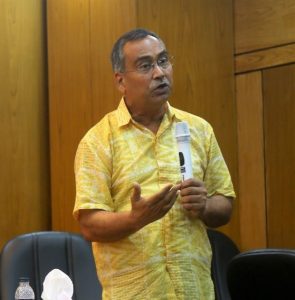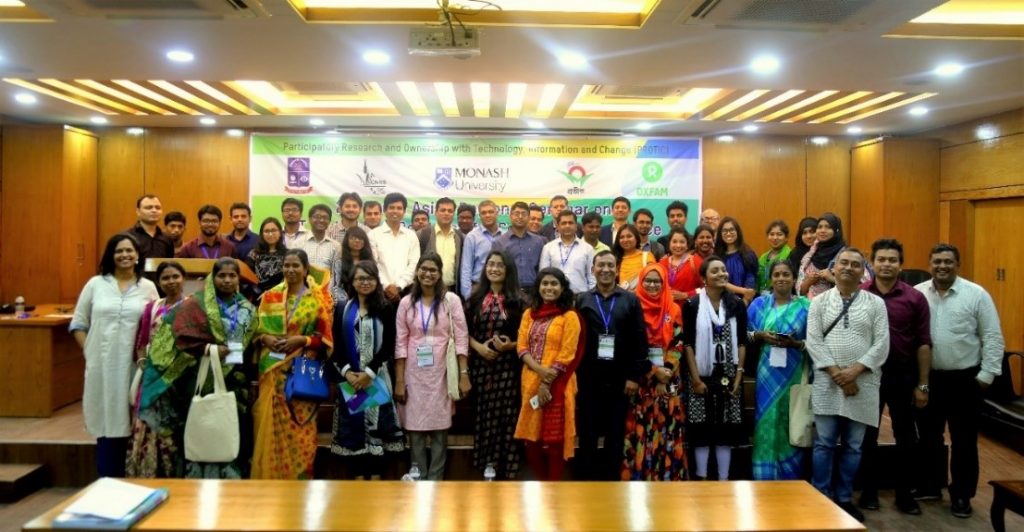Participation Report by Alisha Khan
To have a significant impact on poverty and inequality and keeping the changing pattern of climate into consideration, a 2-day event entitled, ‘South Asian Regional Seminar on ICT and Knowledge Management’ was organized by Oxfam Bangladesh at University of Dhaka on March 12 – 13, 2019. It had wide range of participants coming from CSO’s, NGO’s, media, foreign and local universities along with people from different levels of government in order to support, suggest and contribute to bring out transformative change. In order to achieve this brief discussion took place in form of presentations where speakers put forth their evidence based research for better strategic policy and practice change. It had people addressing issues on sustainable women’s economic empowerment in agriculture for resilience, enhancing the economic situation of poor and marginalised groups relating to climate vulnerability, devising tools for providing relevant, comprehensive and accurate information for adaptive agriculture and challenging indigenous knowledge.

2nd South Asian Regional Seminar on ICT and Action Research for Community Resilience
Day-1 started with the opening speech given by Prof ASM Maksud Kamal, Faculty of Earth and Environmental Sciences, University of Dhaka where he spoke about significance of ICT and knowledge management and why social media is necessary to achieve changes at all levels. Parvez Zaved, Country Director of Oxfam spoke about why participatory action research is important in order to have a wholesome development to beat the social inequalities prevailing in developing countries. Ashitava Haldar, from Centre for Natural Resource studies (CNRS) stated about how South Asian countries have mass agrarian communities having rich community level traditional knowledge and its inadequacy to address the uncertainty and situation triggered by global climate change. He said that as most of the farmers have no hands on experience and access to digital networks, leaders of agricultural research and extension systems should be encouraged to consider ICT options for knowledge decimation. Prof Nasreen Ahmed, Pro-Vice Chancellor, University of Dhaka shared her views on how ICT would help farmers and extension workers including women to access information if each country tries to develop contents in local languages. She shared the importance of ICT in knowledge management and its practical application in addressing changing situation and uncertainties.
The entire programme was scheduled based on 4 themes –
- Action Research in South Asia,
- ICT Based knowledge management,
- Adaptive agriculture and
- Indigenous knowledge.

A speaker during his Presentation
Brief points from presentation and discussion in the theme Action Research in South Asia – Mohd Salim Reza discussed how the situation of women in Nilphamary district of Bangladesh has improved with the commencement of Participatory research and ownership with technology, information and change (PROTIC) under RECALL project for total development of rural women. Sushovan Dhar, social activist based from Kolkata spoke on the condition of exploited and oppressed women workers in tea plantations of Assam and Bengal. He discussed how crucial it is to find a sustainable solution to meet the urgent need to improve their living conditions. Ashitava Halder, upbraided on how non communicable diseases (NCDs) are becoming the major killer disease globally and significantly Bangladesh is registering it adverse effects. He described the necessity and modality of multi-partnership approach, to define the action research method and modalities by actors who are finding preliminary analysis. Sheikh Rokon, spoke on the urgent need of restoring the rivers. Bangladesh, a riverine country that is in a vulnerable situation due to pollution of it rivers, encroachment and unplanned development structures which has led to a profound loss of biodiversity, rivers and livelihoods. His initiative was directed towards restoring the river through implementing a module conceptualized as ‘Academic Documentation on River and Ecology’ (ADORE). He discussed how this approach has achieved a successful implementation in Boral and Dakatia rivers.
Brief points from presentation and discussion in the theme ICT based Knowledge Management – Mohd Roshidul H, spoke on how due to global climate change, the area for shrimp cultivation has been restricted to only southern part of the Bangladesh i.e. Shatkhira district thereby creating congestion for its cultivation at one place; pressurising the cultivation, causing diseases, improper management, natural and man-made disasters etc. To mitigate this, he discussed on the development of System Required Specification (SRS) for mobile apps. With the surveys, focused group discussions and field study, it has the potential to provide need based information to farming communities for their benefits. Mohd Abdur Rahaman Rana, discussed about exploring the framework to ensure food security and nutrition availability to ultra-poor climate vulnerable farmers by promoting climate smart agricultural system in the coastal belts of Bangladesh. He highlighted the use of system on water, agriculture and climate (SWAC) Model. Prof Sheikh Taehidul Islam, shared his experience on how climate change has led to shift in understanding and adapting ICT in order to fill the knowledge gaps. Remizius Remi, focused his discussion on the present understanding and status of ICT and knowledge management in South Asia, especially Bangladesh and a possible link-up work-flow on managing knowledge through ICT to make it usable and easily accessible for individuals and others. Alisha Khan, discussed on how applications as information and communication has to still find feet as climate change calls for reorganising techniques, coping mechanism including ‘community participation’ for which preliminary research is required. She discussed on finding vulnerable areas/pockets via integration of spatial information with voice (Swara) as a tool, technology and a method for local community development. This research was performed on a biological hotspot located in one of the poorest regions of the country. Mohd Rahimullah, presented the impact of Sensor Networks on Biodiversity. He discussed on how modern technology has been misused and caused a serious threat to loss to biodiversity. His research assessed the impacts of wireless sensor network on biodiversity through field experiment at Lawachara National Park (LNP) in Bangladesh.
Brief points from presentation and discussion in the theme Adaptive Agriculture theme – Pradeep Bhattarai, discussed how adaptation practices has been adopted by local farmers of Madi Valley of Chitwan district, Nepal in response to negative impact of climate change. A country with fragile geology, topography, higher dependence of people on agriculture and allied activities, it is facing vulnerabilities due to climate change. Using ICT techniques and methods, people are constructing artificial ponds where rain water harvesting can be done along with fishing. He discussed how local communities have started performing common farming, seed banks and also using hybrid seeds for crops and vegetables and plantation of multipurpose trees near streams. Mohd Tareq Khan, spoke on the importance of community based adaptation in wetland regions where the livelihood of people is at stake due to climate change. He told how the local’s ability towards combating these threats by adaptation approach perceived by Hajipur and Baruna village near Baikka Beel community has led to region being referred to as modern climate resilient ecosystem but still extensive research and government support is required. Vidya Dinker, spoke about the condition of Mangalore farmers who are fighting for their land. She discussed how Mangalore as a district got its recognition through time and with commencement of industrialisation has inevitably destroyed the daily and seasonal cycle of cropping and celebration. She discussed how the presence of crude oil in huge underground caravan pumped by Government of India and Abu Dhabi National Oil Co. (ADNOC) has threatened lives and agricultural livelihoods of people in the region.

A speaker during his Presentation
Dr Siddiqur Rahman, presented his work on new agricultural technologies and gender dynamics. He summarized his findings by saying strong gender norms restrict women from middle and upper middle class to work and participate in the agricultural field, marketing and selling off their agricultural products while extreme poor, widowed and divorced women are forced to do the work. New agricultural innovations are hard to access for both therefore it is crucial for government agricultural departments and facilities and NGO’s alike to make robust attempts to merge this gap for full, potential and collective growth. Bhowmik Joy, addressed on identifying the gaps and need to minimize the risk of Non-economic loss and damage (NELD) occurring due to extreme climatic events in Nijhum Dwip (island), Bangladesh. His research presented an overview of people’s perception about extreme events that are affecting their livelihood and identifying the material and non-material items of different NELD occurred for which conceptual framework designed by Serdeczny, Water and Chan (2016) is used.
Brief points from presentation and discussion in the theme Indigenous Knowledge – Dr Aniruddha Dey, discussed what indigenous knowledge system means and its practical engagement in life. He spoke on how his CSO has developed ‘Innovation and technology promotion unit’ under R&D programme where they are incorporating measures which will help the vulnerable groups to come out of a ‘make-believe’ situation. He described how cultural appropriateness and affordability should be the prime concern without disturbing the environment and ecology to ensure disaster and climate change resilience. Akib Hasan, spoke on the status of tourism service in Karamjal Wildlife Breeding Centre, Sundarbans. He discussed how tourism has stagnated and getting diminished due to climate change and lack of attention. Undertaking interviews/surveys he found that there is a severe need to improve/develop tourist facilities in order to promote sustainable development at Karamjal Wildlife to be a model program.
Concluding the session, Dr AZM Manzoor Rashid, Head Department of Forestry and Environmental Science, Shah Jalal University of Science and Technology said that combination of multiple approaches has definitely helped us all in finding out the solutions which are happening due to climate change, however there are still some challenges that poses threats to our research. To list a few,
- Research validation – it should come from different angles. From scientists and experts to community/locals. There should NOT be just one source. Also, always aim for conventional and participatory action research (grazing of theory with field practices by the joint venture of local communities and users of specific regions)
- Sustainability issues – discontinuation of project due to funding, resource crunch etc. Research to be performed only when these glitches can be taken care off
- Capacity and training building process – what has been learnt through the project – Assess it, improvise it, legal frameworks should be replicated in form of capacity training building process, rise and responsibility should go hand in hand
- Operate user friendly ICT tools and approaches – Apps can be made in a day or two but than there will be another project to clean that app, therefore one must timely assess and update the ongoing ones – it will not only reduce time and space but will also not confuse the users
- Enforcement of legal framework – people should know their rights and do not work beyond limits, regulation and updating of laws should be there
- Not necessary only academic knowledge is required, at all level there are people who are capable enough to teach us. It is on us to find them and involve them with the research.
He concluded by saying that ICT is not a solution to everything or everywhere it is not necessary to use rather it is about how you plan for monitoring and evaluation on a specific theme, know other aspects and work for it. Don’t be too dependent on it, think twice make it a simpler exercise for all.

Participants and the students who attended the program

Recent Comments